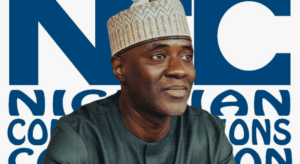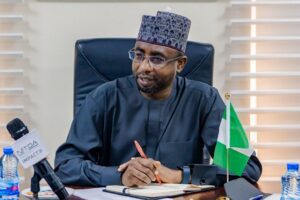Cyber Politics: Scholar X-rays effects of social media on electorates
Joel Oladele, Abuja
An author and Head, Media Relations, Nigerian Communication Commission (NCC), Dr. Omoniyi Ibietan has x-rayed the roles of Social media on the electorates in politics through his book titled “Cyber Politics: Social Media, Social Demography and Voting Behaviour in Nigeria.”
Speaking at the public presentation of the book in Abuja on Tuesday, Ibietan said even though studies have revealed that Social media has 10 per cent influence on the people, any politician who downplays its roles does so at his own expense.
He added that communication stimulates layers of political participation, but it does so in the context of other mediating factors to nudge voter behaviour.
“Social mediation is a central factor. In a study that we did, which is a mixed methodology design. It’s truthful, it’s factual. It revealed that Social media has 10 per cent influence on the behaviour of the voters.
“Although social media is critical, it operates in the context of certain mediating factors. You will dismiss social media at your expense,” the author said.
He also noted that social media has been in existence before the advent of the internet, and that the internet only brought about the modern digit social media.
“What we are experiencing today is digital social media, social media did not start with the advent of the internet. All of us were on campuses, when you see notice board displays articles on campuses and people go there to use their pen to write things like ‘this is trash, you are not serious, the Vice Chancellor is a thief…’
“It has a social mediation but not in a digital context. So what we have found is we have digital social media and the power is inherent in what technology has made possible. The human sociality interfaces with technology and so the effects of digital social mediation, of course, supercedes what we have seen on our campuses as students,” Ibietan noted.
Reviewing the book, the Editor-in-Chief, Leadership Newspaper, Mr. Azubuike Ishiekwene said the book is not just about the last general elections, but an accumulation of the exploratory journey of the author, Niyi Ibietan.
Azubuike said the book examines the theme of Cyber Culture, Socio Demography and Political communication.
“Cyber politics is not about the last general elections. It’s a deeper thing in the exploratory journey of Niyi Ibietan. In his exploratory journey and his interest in Political Communication and his sociology which goes way back to the schooling days.
“What started as mere curiosity in his undergraduate days and his early working life on the role of media in enhancing freedom soon found expression in his journalism and his monographs.
“This passion which later deepened in his Masters dissertation has crystallised in the formidable academic work which is the subject of this review.
“In 12 chapters of 460 pages, including the bibliography set against the background of Nigeria 2015 general election. Cyber Politics examines the theme of Cyber Culture, Socio Demography and Political communication.
“It is a subject that revokes decades of research which nonetheless retains its fascination as scholars continue to explore the fourth question of why voters behave the way they do, especially during elections,” Azubuike noted.
The book reviewer added that recent studies have proven that politicians now spend heavily on social media campaigns to reach out to their constituents more than they do on mainstream media.
He quoted a BBC online study as saying: “Politicians are investing heavily on the use of websites, blogs, podcasts, and social networking websites like Facebook and Twitter as a way of reaching voters. During the 2019 election, the conservatives spent 1 million Pounds on Facebook alone. At a point, they ran about 2,500 ads on Facebook.”
He also noted that the book, Cyber Politics is a valuable resource for researchers and students.
“The author explained at page 63 that the three social media networks, Facebook, Twitter and WhatsApp were chosen because of their capacity for sociality.
“Specifically for the following politics: conviction, communication and community and these are of course the soul of social media. In chapters four, five, nine and ten, Cyber Politics deals with questions on research, theory and modules which brings the intrinsic perspective of political communication in Africa.
“In light of the exponential growth in social media adoption in the last few years, two election cycles after 2015, COVID-19 and Endsars. Students, researchers and scholars will find Cyber Politics a very valuable resource,” he recommended.
Also present at the event were: Former Minister of Information and Communication, Frank Nweke 11, the Majority Leader of the 10th National House of Representatives, Prof. Julius Ihonvbere, A Public Affairs Analyst, Mr. Mojeed Dahiru, Professor of Mass Communication, Prof. Abiodun Adeniyi amongst others.




